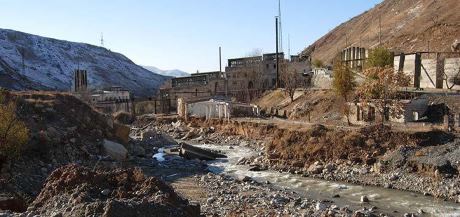The European Bank for Reconstruction and Development (EBRD) has signed framework agreements with the Kyrgyz Republic and Tajikistan, a precondition for the implementation of projects under an EBRD fund to deal with the remediation of former uranium mines and processing plants.
 |
| Very little remediation work has been carried out at the legacy sites (Image: EBRD) |
The EBRD established the Environmental Remediation Account for Central Asia in May 2015, at the request of the European Commission, to finance projects to rehabilitate high-priority sites in Central Asia. The Commission provided an initial €8 million ($9 million) in funding.
Central Asia was an important uranium-producing region in the former Soviet Union, leading to a large accumulation of radioactive contaminated material at mines in Kyrgyzstan, Tajikistan and Uzbekistan and placed in waste dumps and tailing sites. Most of the mines were closed by 1995, but very little remediation of either mining sites or tailings storage facilities has been carried out.
Many of the uranium legacy sites are concentrated along the tributaries to the Syr Darya River, which runs through the Fergana Valley, a densely populated region that is also an agricultural centre shared by Kyrgyzstan, Tajikistan and Uzbekistan.
The London-based EBRD said accumulation of radioactive contaminated material in the region is a threat to the environment and to the health of the population, a risk which it added has been recognised in a United Nations resolution, which calls for support for the affected countries.
The framework agreements the EBRD announced yesterday are a precondition for project implementation in the Kyrgyz Republic and Takjikistan. They set out conditions for implementing the remediation program, such as tax exemption, the application of EBRD policies, including the bank's environmental and social policy, procurement rules and policies, and provisions for effective and efficient project implementation.
EBRD first vice president Phil Bennett said the conclusion of the framework agreements with Tajikistan and the Kyrgyz Republic marked an important milestone. "The preparatory phase of the Environmental Remediation Account has come to a close and work can start to address a serious hazard for the population of Central Asia and for stability in the region. We look forward to cooperating with our partners in the region as well as with donors to help achieve this important goal," he said.
Researched and written
by World Nuclear News






_97013.jpg)
_51413.jpg)






